Coliving is a growing trend, burgeoning in cities all over the world. Yet, as a relatively new player in the world of real estate and housing, it faces a myriad of challenges.
At our last meetup hosted at Happy Pigeons, we invited participants to discuss the barriers that the coliving sectors faces in regards to the four pillars of the Conscious Coliving Manifesto which are as follows:
– Aligned Policy and Regulations
– Sustainable Financial Model
– Supportive Spatial Design
– Wise Management and Operations
The following tables summarize the main points each group, including input from Happy Pigeons, Venn Raum Berlin, Coconat and The Fizz.
We do not want to put anyone off by these challenges as they do seem like a lot. However, we thought it important to gather collective wisdom on the barriers and difficulties regarding each area so that we can better address and identity appropriate solutions more comprehensively. We are already aware of many strategies to help overcome key challenges and we will be happy to share these more in detail in future posts.
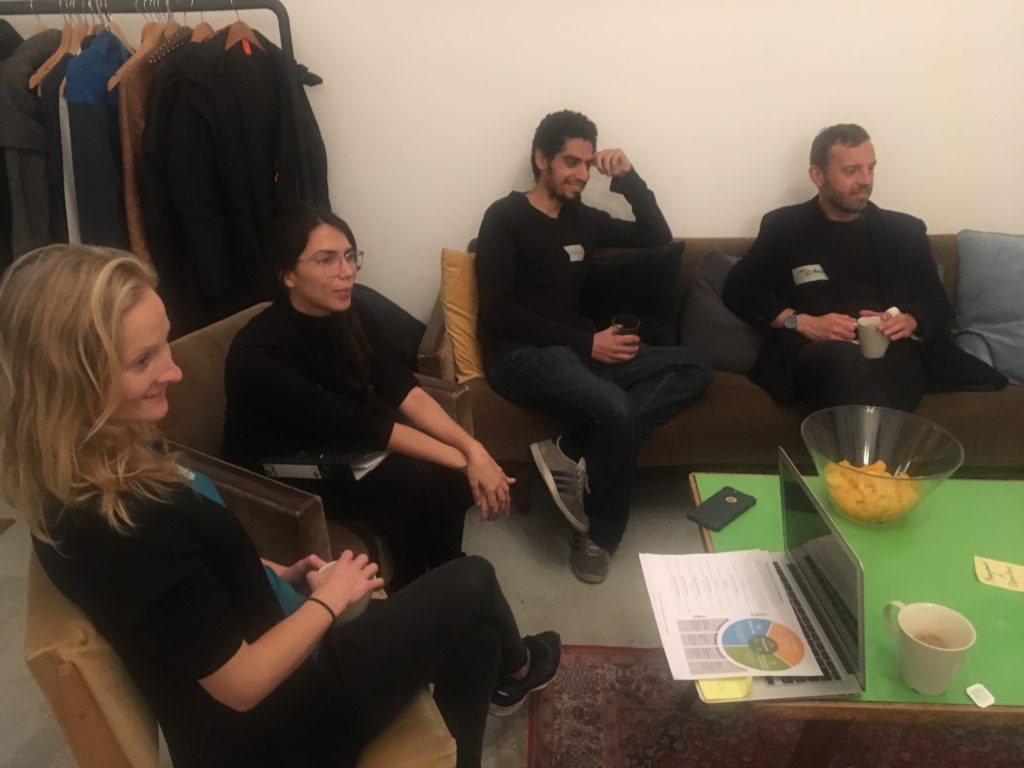
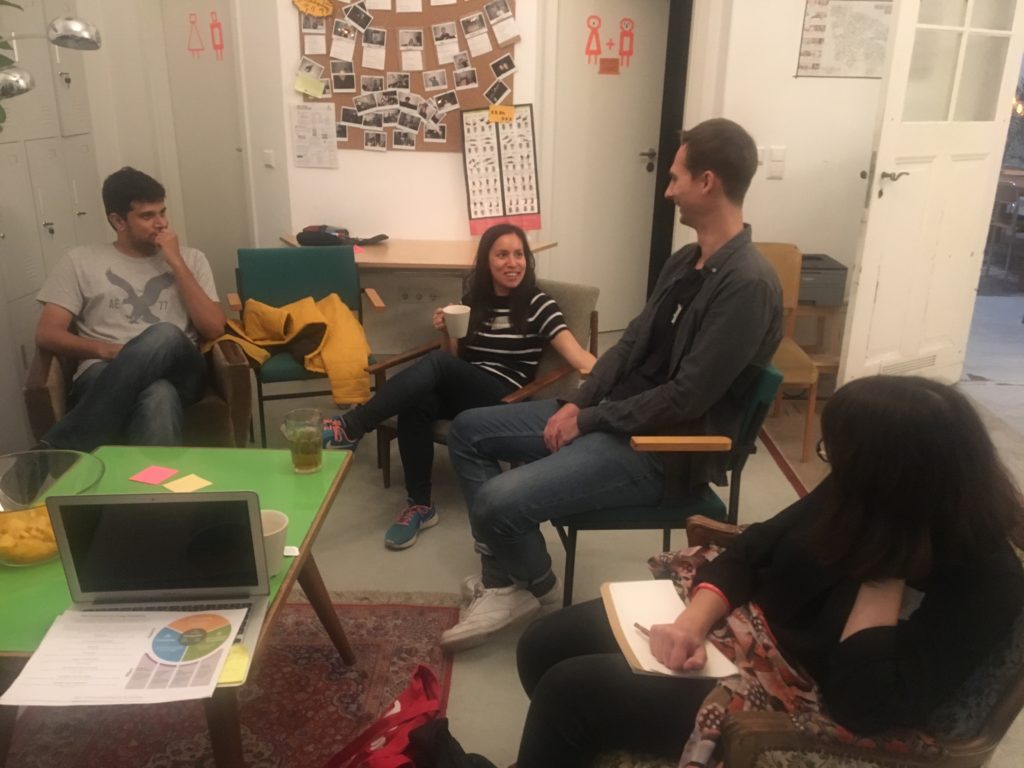
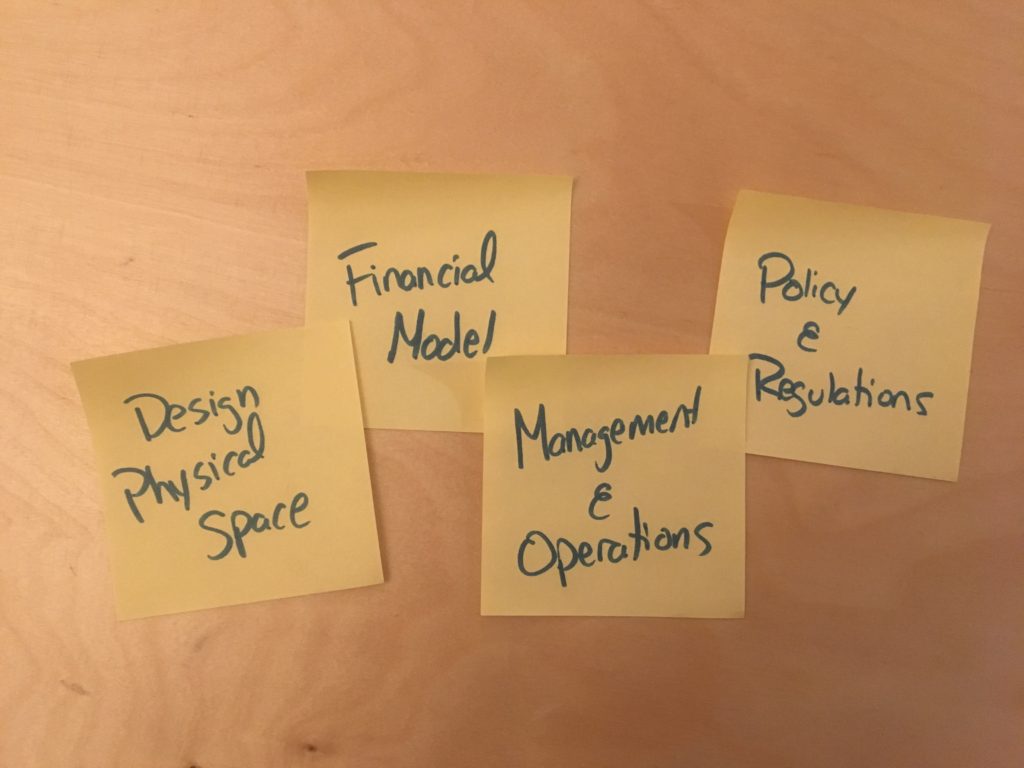
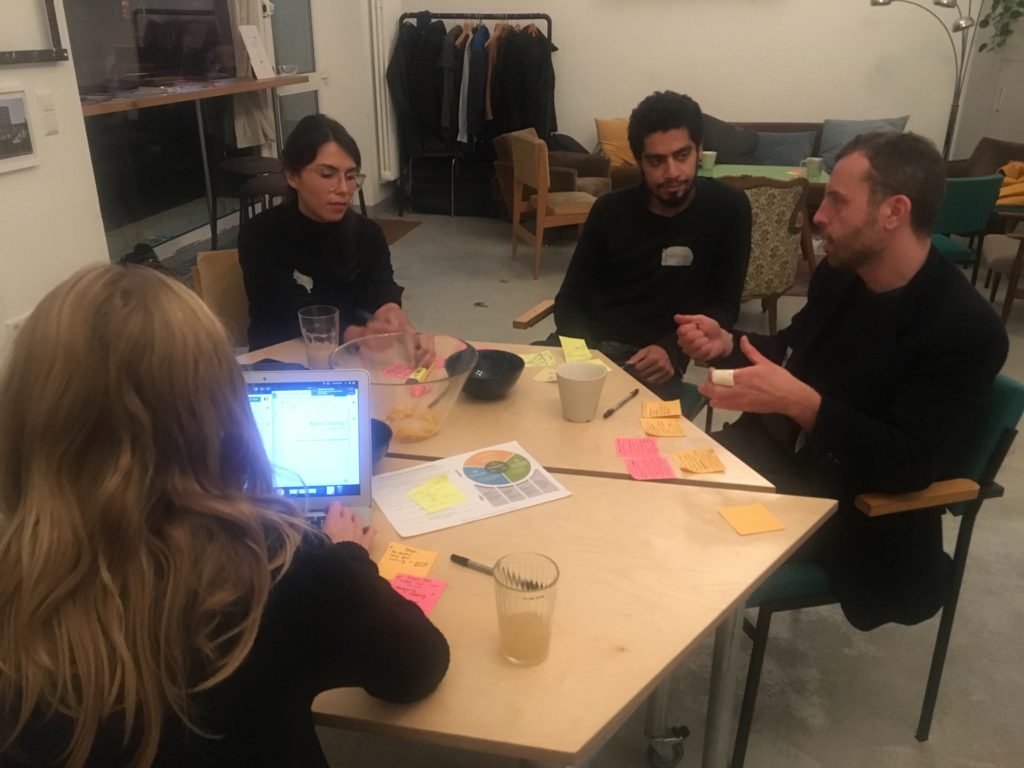
Aligned Policy and Regulations
What are the challenges around policy and regulations? | |
Category | Description |
Grouped regulations | Often the same regulations cover a range of housing, zoning, and accommodation types, which can actually have quite different characteristics. There is a need for more type- specific regulation. |
Negative/suspicious perception | People are not always welcoming of new ideas. They can be suspicious. In Berlin, some coliving spaces have been vandalised by anti-gentrification activists. |
Lack of awareness/understanding of coliving | Many governments do not understand what coliving is. |
Zoning laws | Some zoning laws are more enabling for coliving than others. Some designate first floor as commercial space, and second floor zoned as living space. Commercial zoning is more flexible but there are also more taxes and regulations. |
Lack of regulations | In some countries like India, there is a lack of relevant regulations so the government might reactively create a new law restricting something an operators recently created. This means that housing developers and operators may have to deal with changes very quickly. |
Lack of measurement/impact | There is barely any measurement of experience, benefits and impact of coliving. Currently, planners mostly measure price and space. |
Lack of rental protection | Most cities do not have policies and regulation regarding rent control. |
Outdated regulations | Many regulations are outdated for the way that people currently live. |
Lack of public-private partnerships. | There are very few public-private partnerships for enabling coliving. |
Sustainable partnerships | After establishing a partnership between a coliving provider and a local business, it can be difficult to maintain the partnership. Further pain points include success measurement and lack of effective communication. |
Sustainable Financial Model
What are the challenges around developing a sustainable financial model? | |
Category | Description |
Resident POV | |
Unaffordability | In many cases, the coliving sector has not proven to be more affordable than other contemporary residential options. |
Investor/Developer POV | |
High initial costs | There can be high initial costs involved in developing coliving, especially the high cost of land. |
Coliving perceived as high risk | As a relatively new asset class, there is still a perception that coliving lacks proof of concept. |
Uncertain profitability | Fixed costs are different than traditional real estate. Communal spaces need to be accounted for as non-rented rooms. There can be more admin and operational costs with coliving. Profitabilty can also depend on occupancy rate. |
Operator POV | |
Lacking mixed model approaches | Most coliving spaces depend on rent as main source of income (vs. a mixed-model approach which could include income from co-working, renting spaces, food and beverage, partnerships, etc). |
Tension between profit and community mindset | The real estate mindset focuses on maximizing profit: maximizing beds so that more people pay rent. A community-based mindset focuses on having larger private and communal spaces. But this can be less affordable/profitable. |
Spatial Design
What are the challenges around spatial design? | |
Category | Description |
Flexibility of Space | Often there is an unmet need for spaces to fill several purposes (living, working, cafe, kitchen, etc). |
Lack of community/resident input | Some coliving schemes allow for little resident input which can reduce a sense of ownership and belonging. |
Lack of feeling cosy/homey | Often there is a lack of consideration for how to make spaces feel cozy, homey, and sanctuary-like, which are basic human needs for feeling safe and comfortable. |
Balance between private and communal spaces | Often much attention is given to communal spaces in coliving, but private spaces are overlooked. |
Retrofitting | Old buildings may not be built for community. Repurposing can be difficult and expensive (e.g. updating heating system etc). |
Acoustics | There is often inadequate acoustic consideration between rooms and floors. Any loud sound or music can bother other residents. |
Kitchen design | Some kitchen designs do not invite people to cook or share meals together, a key component of community-building. |
Lack of connection to nature | Most coliving spaces are in urban areas with little consideration for how to integrate nature and natural elements which are crucial for wellbeing. |
Bedroom design | Often bedrooms are not designed optimally for privacy, comfort, flexible working space, etc. |
Location | Difficult to find ideal space for coliving concept you want to create. Often difficult to be near public transport. |
Planning community spaces early on | In a big company, departments often do not communicate enough with each other to respond to different requirements, including planning community spaces. Spatial design needs to be brought into architectural planning at an early stage to ensure the full use of possibilities. |
Wise Management and Operations
What are the challenges around management and operations? | |
Category | Description |
Security | Risk of crime, such as theft. |
Cultural differences | People of different cultural backgrounds can have different expectations and needs that a coliving space may or may not be able to provide. |
Lack of trained community manager | Some coliving spaces do not have properly trained community managers. |
Cost of community manager | Community managers are an extra cost for operators. |
Overloaded community canagers | Sometimes community managers are overworked, constantly on “on-mode”. |
Rental agreements | Rental agreement can lack clarity. Coliving is not just offering a room, but also a lifestyle and experience. |
Residential responsibility | Sometimes lack of onboarding or guidelines means residents act irresponsibly. |
Short-term vs. long-term focus | Operators can be so focused on solving daily problems that have no time to think about long-term strategy, vision, impact, etc. |
Communication | Residents need a way to report problems. Residents need a way to communicate with each other. Sometimes these do not exist. |
Community engagement | There is often a lack of engagement of residents in community events. |
Time-consuming processes | There is a need for automating or streamlining processes. |
Overloaded staff during peak season vs. constant move-ins and move-outs | Staff can become overloaded managing dozens of move-ins and/or move-out occuring during the same days. It can be easier to have fewer but constant move-ins and outs; however this short-term rental model can make community-building difficult. |
House Manager responsibilities | Sometimes there is a lack of clarity about house manager responsibilities: on-site marketing, sales, community building, partnership development, staff supervising etc. |

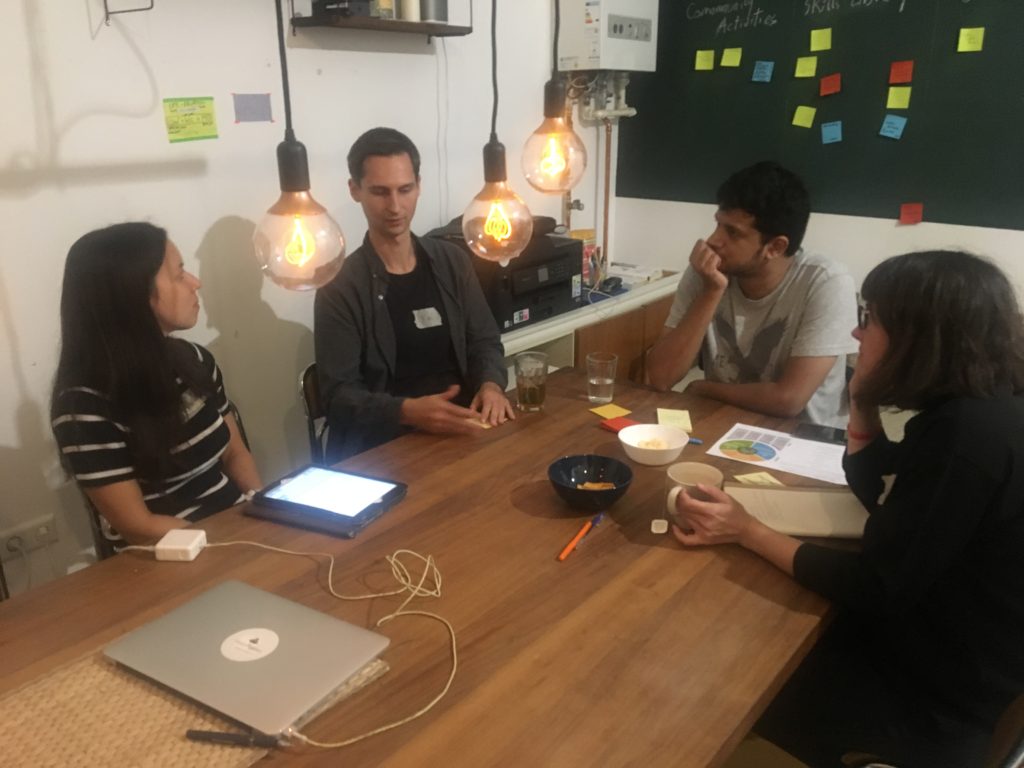
At the end of the meetup, participants shared their key take-aways. Many appreciated the structure of the meetup which allowed us to break down each topic area and focus on thinking about the challenges related to each.
Interestingly, participants noticed many challenges that are similar for both small and big scale coliving operators, for instance that operators often find themselves firefighting day-to-day issues without much time for long-term strategic thinking.
Finally, it was clear by the end of the meet-up that public-private partnerships could play a critical in the future of coliving. For that, collecting data and measuring impact at each of the stages of a coliving development is vital. Also, taking all these into consideration when defining your coliving business model.
Despite all the challenges identified throughout the meet-up, participants shared that they left feeling encouraged by having gained a more thorough understanding of the sector and its challenges in a way that made them feel more empowered and knowledgable.
We look forward to sharing strategies for overcoming these challenges in the future.
Do you need support in any of these areas? Feel free to explore our coliving consultancy services and don’t hesitate to get in touch.
This article has been coauthored for you by:
Penny is Director of Research & Sustainability at Conscious Coliving. She has an MSc in Social Research Methods, and her PhD explores how shared living may enable lowered environmental impacts. She has consulted on numerous shared living projects, specialising in impact strategy, concept, and community. Penny has presented at conferences including the Co-Liv Summit, the Urban Living Festival, BTR360 and more. She has also authored publications in The Developer, Coliving Insights Magazine, the book Urban Communal Living in Britain, as well as being interviewed by the BBC and the Guardian about shared living.
Transformational Coach and facilitator. Trainer in mindfulness, sharing circles, and how to live and lead more consciously. Co-author of the Community Facilitation Handbook and the Coliving Apps & Tech Guide. Facilitates community engagement strategies.
Tom Manwell is a fully qualified U.K. architect. Before founding his two current companies, Tom gained experience with a range of award winning practices working on small, medium and large scale residential schemes in London, the U.K. and Europe.